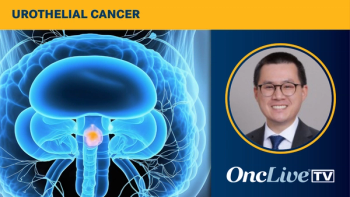
Clinical Trial Data With Perioperative Therapy in MIBC: Bladder BRIDGister
Expert panelists reflect on the molecular subtyping of patients to predict response to neoadjuvant therapy in Bladder BRIDGister.
Episodes in this series

Transcript:
Shilpa Gupta, MD: We had one more abstract presented at ASCO GU [American Society of Clinical Oncology Genitourinary Cancers Symposium] called the BRIDGister trial. Mamta, would you like to discuss that abstract briefly, or Petros?
Petros Grivas, MD, PhD: I stopped by that poster, it drew my attention, and I spent some time talking to folks. If I remember correctly, Shilpa, these are the folks from Germany who developed a composite biomarker looking at Nectin-4 and TROP-2 antigens, they looked at luminal vs basal, FGFR1 alterations, very interesting. I think this whole idea is how can we develop and validate robust molecular biomarkers in the muscle-invasive disease space, especially neoadjuvantly, to try to predict response to neoadjuvant therapy. They had some very interesting data looking at what changes between before and after neoadjuvant therapy in those patients.
If I remember correctly in the poster, they looked at TROP-2, and Nectin-4 expression, and they saw some enrichment in luminal molecular subtype, and saw some difference, maybe some reduction in the expression of those molecules. Obviously, the question is, what does that mean in clinical practice? We need more validation. They looked at FGFR1 mutations as a potential mechanism of resistance to neoadjuvant treatment.
I think overall the poster was very interesting. I think it’s great work to try to synthesize and combine different putative biomarkers in a composite biomarker approach. It looked interesting to me but still not practice-changing. If anything, we need to standardize our biomarkers and try to do prospective trials, try to prove they’re clinically useful. Clinically useful means if we incorporate them in clinical practice, it can improve outcomes. So a very interesting study, it drew my attention. I stopped and talked to them, but I think we need more trials before the incorporation of those biomarkers in clinical practice.
Shilpa Gupta, MD: You’re right, Petros. I think it’s really important that all our ongoing trials come out with a biomarker, not just clinical data.
Transcript edited for clarity.









































